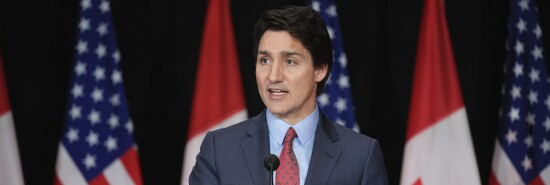
Canada cannot be allowed to join AUKUS
Tom Rogan
Video Embed
Canada cannot be allowed to join the AUKUS nuclear submarine accord.
That agreement between Australia, the United Kingdom, and the United States will establish a nuclear submarine force for Australia. It also facilitates cooperative high-tech research. AUKUS’s underlying purpose is to boost Western defense capabilities in the face of China’s threat. The Globe and Mail reported on Monday that Justin Trudeau’s government wants to become AUKUS’s newest member. Asked about that possibility, Canadian Defense Minister Anita Anand stated that “Canada is highly interested in furthering cooperation on AI, quantum computing, and other advanced technologies with a defense nexus with our closest allies. Our ties with our Five Eyes allies are strong, and indeed we remain interested in furthering cooperation in AI and other innovation efforts with our allies.”
It sounds good. Unfortunately, while Canada’s CSIS and CSE intelligence services are well-regarded by their U.S., U.K., and Australian counterparts, Trudeau’s government is a weak link on China.
It’s likely that Canada wants to join AUKUS for two reasons that have little to do with China — namely, to access economically valuable technologies and to benefit from the diplomatic prestige that participation would entail. But Trudeau doesn’t deserve that opportunity.
This represents a shift from the situation under the Trump administration. Back then, Trudeau was still willing to confront Chinese challenges to the democratic international order. No longer. Just last week, Trudeau again showed his unwillingness to resist China’s attacks on democratic security.
The issue arose when The Globe and Mail, and notably not Trudeau’s government, reported that Beijing had targeted a Canadian parliamentarian’s family after he criticized China’s human rights record. Trudeau did nothing until news of this outrage became public. Trudeau then equivocated for days. Only on Monday did Canada finally expel a Chinese diplomat. It’s clear that Beijing senses weakness. In announcing the retaliatory expulsion of Canada’s Consul General in Shanghai, a higher-ranking diplomat than the diplomat Canada expelled, the Chinese foreign ministry didn’t hold back on Tuesday.
“China never interferes in other countries’ internal affairs,” a spokesperson said. “The interference claims about China are unfounded. They are ideology and politically driven manipulation designed to slander and denigrate China.”
The spokesperson concluded, “We urge Canada to stop its provocation at once. If Canada decides to continue its wanton act, China will react firmly and all consequences arising therefrom must be borne by Canada.”
Does this seem like the rhetoric of a government that is concerned it has been caught targeting the primary democratic institution of a G-7 power? Give me a break.
Trudeau’s Canada is no longer a reliable U.S. ally. Alongside New Zealand, Canada’s current government makes it a weak link in the Five Eyes intelligence alliance. This weakness isn’t simply measured by Trudeau’s policy toward China — it also takes root in his disdain for burden-sharing. While the U.S. has concerns over the U.K. and Australia’s resolve in the face of Chinese threats, those nations are at least boosting their respective military capabilities. Canada is doing nothing of the sort. And don’t take my word for it — take that of the Canadian defense minister.
Canada is one of the lowest defense-spending members of NATO, allocating nowhere near the alliance’s 2%-of-GDP minimum spending target. As the security analyst Patrick Fox observed, this neglect lends a special arrogance to Canada’s request that it now be trusted to join AUKUS. Last year, however, defense minister Anand claimed that she would present “aggressive options” to boost defense spending toward the 2% target. But when the latest budget was unveiled in March, the numbers testified to a different reality. Canada’s defense spending is likely to see further trimming, even in critical areas such as procurement.
This is not what serious allies do.
CLICK HERE TO READ MORE FROM THE WASHINGTON EXAMINER
Some disagree. Thomas Juneau, a professor at Ottawa University, told The Guardian that Canada is “not going to be brought into these groups just because we’re a traditional ally; we’re going to be brought into these groups because we can make the case that we have something to contribute, which in some cases, is a case that we can make.”
That’s wishful thinking. Canada has neither earned AUKUS engagement nor provided the confidence that its inclusion would offer more benefits than risks. Until the Canadian government takes its alliance commitments more seriously, it cannot be allowed to participate in this important agreement.
